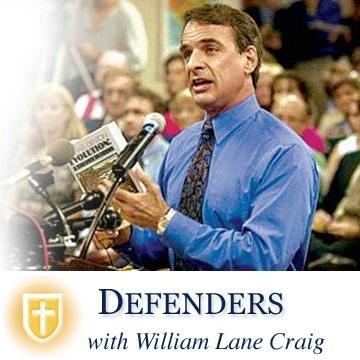Defenders: Excursus on Natural Theology (Part 20): The Moral Argument Part 3
Defenders Podcast
William Lane Craig
4.7 • 724 Ratings
🗓️ 24 August 2022
⏱️ 25 minutes
🧾️ Download transcript
Summary
Transcript
Click on a timestamp to play from that location
| 0:00.0 | Welcome to Defenders, the teaching class of Dr. William Lane Craig, today an excurses |
| 0:10.0 | on Natural Theology, Part 20. |
| 0:13.4 | For more resources from Dr. Craig, go to reasonable faith.org. |
| 0:18.2 | We've been talking about the moral argument for God's existence, and last time we looked at an |
| 0:24.8 | objection to the first premise, which is that if God does not exist, objective moral values |
| 0:31.1 | and duties do not exist. |
| 0:33.6 | And that objection comes from Plato's dialogue, Youuthyphro, in which Plato says that if you say |
| 0:41.7 | that something is good just because God wills it, then that makes good an evil arbitrary, |
| 0:48.5 | which seems wrong. |
| 0:50.3 | But if you say God will something because it really is good, then the good is independent of God, |
| 0:57.0 | and therefore needn't be dependent upon Him for its objectivity. |
| 1:03.0 | And I suggested that this is a false dilemma that what Christians say instead is that God will something because He is good. |
| 1:12.6 | That is to say God is himself the standard of goodness and value. |
| 1:18.6 | And that nature then is expressed toward us in the form of divine commandments which constitute our moral duties. So moral values are rooted in the nature of God. |
| 1:31.0 | Our moral duties are rooted in the commands of God. Now was there any final discussion or |
| 1:38.1 | question about this solution to the objection before we proceed? Dennis. So Bill, would it be correct to say that God then never deliberates over good and evil, |
| 1:50.0 | but simply is the good and there's no choice made? |
| 1:55.0 | He might deliberate over right and wrong. |
| 1:59.0 | Robert Adams, who defends this divine command theory of morality, |
| 2:03.6 | would say that not every moral command is necessarily true that God could issue certain commands |
| 2:11.3 | such as one has, for example, in Old Testament laws that are provisional and temporary, |
| 2:18.8 | so he could deliberate over that. |
... |
Please login to see the full transcript.
Disclaimer: The podcast and artwork embedded on this page are from William Lane Craig, and are the property of its owner and not affiliated with or endorsed by Tapesearch.
Generated transcripts are the property of William Lane Craig and are distributed freely under the Fair Use doctrine. Transcripts generated by Tapesearch are not guaranteed to be accurate.
Copyright © Tapesearch 2025.

